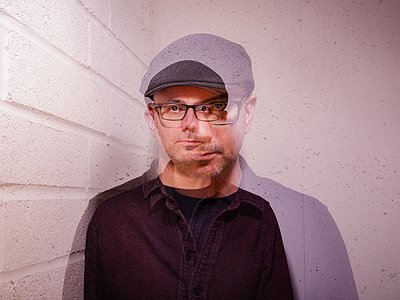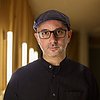Part 1
Name: Samuel Sharp
Occupation: Saxophonist, composer, producer, sound artist, improviser
Nationality: British
Current release: Samuel Sharp's Consequential is out June 16th 2023 via Blackford Hill.
Recommendations: Two different artists who have stayed with me recently are:
Lee Krasner, whose exhibition at the Barbican Art Gallery in London inspired one of the pieces on my new album, “Krasner With The Kids” - just great, great abstract art. Check out “Abstract No,2 1946-98.”
I’m also really into the art of Angie Lewin of late, beautiful linocut / wood engraving prints of nature – she’s the wife of Simon who runs my new label Blackford Hill Audio. Check out “Frost Garden.”
If you enjoyed this Samuel Sharp interview and would like to stay up to date with his music, visit his official website. He is also on Instagram, Facebook, twitter, and Soundcloud.
When I listen to music, I see shapes, objects and colours. What happens in your body when you're listening? Do you listen with your eyes open or closed?
My visual and physical reaction to the music I’m listening to varies a lot depending on where I am and what I’m listening to. For more detailed / cerebral / ambient music, I’m likely to close my eyes so I can hone in on all the details and / or let the music wash over me without visual distractions. If it’s more groove based, I’m looking around, smiling, nodding my head or bopping around, feeling the bass and beats through my core.
If I’m travelling around I try to allow the music to accompany what I’m seeing on my journey, so it’s eyes open staring out of the window, unless it’s a packed commuter train and I need to avoid eye contact! If I’m doing detailed mixing work in the studio I often turn off the screen or shut my eyes when reviewing so that I’m being led by my ears and not by my eyes.
What were your very first steps in music like - and how do you rate gains made through experience versus the naiveté of those first steps?
The first instrument I played was the recorder, closely followed by the clarinet, piano and saxophone. I was a relatively sensible kid and pretty much followed my teachers’ instructions at first, avidly getting ahead in the books I was given. So I guess I was naïve, but under guidance, which I really enjoyed, just being fascinated by making sounds and following rules to get results.
It was only when I started experimenting with composing and improvisation that I would have those magical moments of serendipity I think you’re hinting at here. Just taking risks for the sake of it, especially on the piano, with all those possibilities laid out right in front of you.
It can be a challenge to recreate the playfulness of those initial expeditions once you have years of playing and writing under your fingers, but I still find ways to shake myself out of my habits thankfully.
According to scientific studies, we make our deepest and most incisive musical experiences between the ages of 13-16. What did music meant to you at that age and what’s changed since then?
I was lucky to be playing in a lot of incredible bands at that age, especially the local youth jazz band which had brilliant educators, won national competitions and toured around Europe. So at that age music meant practice, constant gigs, a big part of my social life, high adrenaline performances, travelling, laughing, and learning the ropes on the band stand.
I was composing and improvising a lot in that period too, but never over-thinking anything or taking myself seriously at all, and rarely sharing my writing outside of a few close friends. I think I really took music for granted at that age.
These days it’s easy to take myself too seriously, approach everything from a “professional” point of view and sometimes the fun / community / social aspect can get lost. Especially as my recent show is a solo thing.
Over the course of your development, what have been your most important instruments and tools and how have they shaped your perspective on music?
Instrument-wise it has to be the sax primarily, it’s been there my whole life, well since I was around 11. It just became my thing, the thing I could do, the thing I loved every time I picked it up - I still get a buzz every time I get it out of the case. I was heavily into jazz, so this meant that my approach and perspective on music was naturally skewed to the groove, improvisation, and expressing melodies.
After initially focussing on reading music, as a teenager I was using my ear a lot more, picking things up, desperate for any performance opportunities, like the footballer who always asks for the ball and wants to run with it. I then steadily spread out into playing horn sections in local bands, and at university I also pivoted into electronic music in a big way. Initially just going out clubbing with friends up in Leeds, this was the late 90s so it was drum n bass, techno, acid jazz and house music where I ended up.
At that point I got into using samples, synths, and DAW software and steadily started to build up a studio, bit by bit. My favourite tools currently are my small collection of synths, Ableton / Cubase on the DAW front (with gazillions of plugins) and the set of pedals I use on my solo sax gigs.
What, would you say, are the key ideas behind your approach to music and what motivates you to create?
At the moment I’m heavily focussed on making music I can perform live, and after various iterations this has resulted in the solo sax / electronics pieces that featured on my first two albums. I love writing and experimenting with a small set of harmoniser and delay pedals, it has an immediacy and buzz about it that is different from my other compositions and productions.
My aim is also to tell stories in my music, sharing memories and experiences with the audience, talking them through it as I go, encouraging them to imagine the scenes with me. It’s more in tune with folk music from that point of view. This feels natural, intimate and accessible, compared with perhaps some of my older sets behind a laptop and table of synths, where the concepts would be abstract and ambiguous, open to interpretation.
Both have their place, but recently my motivation is all about imagining myself on stage, sharing my music and the stories with people, so I write with that goal clearly in mind.
Paul Simon said “the way that I listen to my own records is not for the chords or the lyrics - my first impression is of the overall sound.” What's your own take on that and how would you define your personal sound?
This really depends on where I’m up to in the process. With my solo sax work, initially it’s all about finding interesting effects, responding to them, focussing on which notes / harmonies / intervals satisfy my curiosity. Then recording sketches, picking out my favourite bits, tweaking, refining and gradually coming up with finished pieces.
So at that point the devil is definitely in the detail – what key am I in vs the harmonies that the technology is throwing back at me, what time signature might work against which delay setting, where can I improvise vs which bits should be more controlled and composed. Afterwards I then start to form wider impressions of my sound as a whole, thinking more about energy levels, larger sections and arrangements.
My personal sound could be defined as constant cycles of story-telling energy, electrified saxophone performances that sit between classical minimalism, jazz and electronic music. Someone once described my music as “pastoral”, which I quite like too.
Sound, song, and rhythm are all around us, from animal noises to the waves of the ocean. What, if any, are some of the most moving experiences you've had with these non-human-made sounds? In how far would you describe them as “musical”?
I love the feeling of standing at the top of a hill or mountain, with the wind and rain all around you in chaotic bursts of audio, making you feel alive, like some kind of ultimate immersive mindfulness.
Ambient nature experiences aside, I’ve had some extreme experiences too – like getting dragged out on a rip tide in France on a surfboard, with huge panic setting in each time the normally soothing wave sounds pelted me further out to sea. Or the splash I recently felt as I crashed into a local canal off my bike – an experience I have recreated in my piece “Canal Crash” on my new LP.
I think I can find music in most of these experiences, but perhaps they don’t always feel musical in the moment, unless there’s a definite pitch and rhythm, like with birdsong.






